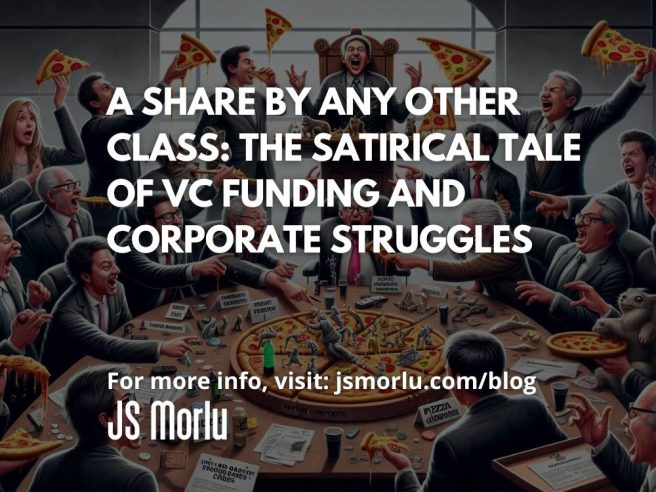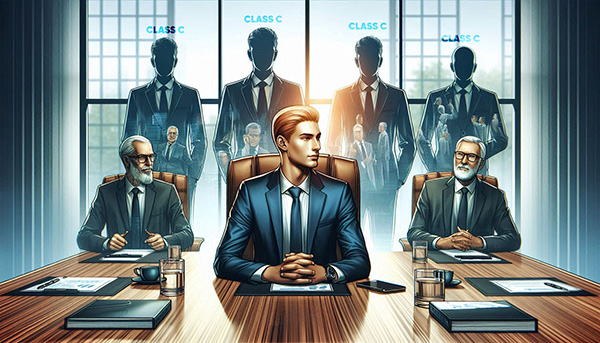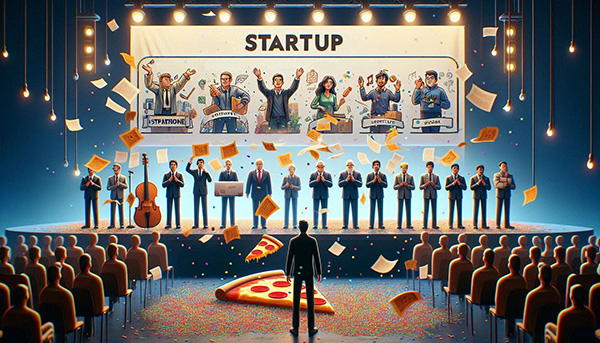By: John S. Morlu II, CPA
Once upon a time, in the frenetic heart of Silicon Valley, there existed a corporate jungle so labyrinthine that even the sharpest minds from Orwell’s Animal Farm would have been flummoxed by its bewildering hierarchy. This jungle was not populated by feral beasts or talking pigs, but by venture capitalists (VCs)—those enigmatic figures whose influence could elevate a humble garage startup into a multi-billion-dollar titan or relegate it to a cautionary tale for future entrepreneurs.
In this dizzying realm, startups didn’t merely seek funds; they navigated a Byzantine maze of financial intricacies, epitomized by a bewildering array of share classes. Picture it: Class A, Class B, and the elusive Class C shares darting around boardrooms like golden tickets in a high-stakes game of corporate Monopoly. But instead of winning a magical trip to a chocolate factory, you might find yourself with diluted voting rights, consigned to the kiddie table of shareholders’ meetings, and utterly powerless to influence whether your company would embark on a quixotic quest to deliver pizzas to the Moon.
This complex dance of equity and control was less about straightforward funding and more about a game of chess where the stakes were your vision, your company’s future, and sometimes, your sanity. So buckle up, dear reader, as we dive into this satirical tale where share classes are the chess pieces, VCs are the grandmasters, and every boardroom meeting is a thrilling round of corporate high-stakes poker. Welcome to a world where dreams are distilled into stock options, and every share class has its own brand of corporate sorcery.
Chapter 1: Introducing Our Cast of Corporate Circus Characters
As we venture into the comedic maelstrom of Silicon Valley’s startup scene, let’s get acquainted with the motley crew steering the ship of Disruptify. Each character embodies a quintessential role found in the high-stakes, high-strung world of venture capitalism and startup drama. Hold onto your hats—this isn’t just a cast; it’s a parade of archetypes straight out of a corporate sitcom.
1. Evan “The Visionary” Moneymaker
Meet Evan, the self-styled “Visionary” behind Disruptify, a company that promised to “revolutionize the way we think about thinking.” Evan’s brilliant idea? A digital meditation pillow that, through the magical combination of AI and blockchain, would adjust your chakras in real-time. Who needs to actually achieve enlightenment when you can have a pillow that does it for you, right? Evan often bragged about his product with a grandiose air, claiming it was the pinnacle of technological evolution. In reality, it was a pillow that beeped at you every 10 minutes, reminding you to “breathe deeply and think positively.” The irony wasn’t lost on anyone, especially as his meditation pillow’s primary achievement was ensuring he had a very well-padded ego.
2. Victoria “The VC Whisperer” Goldclutch
Enter Victoria, the venture capitalist with a knack for finding startups that would either skyrocket to success or plummet into a glorious failure worthy of a TED Talk. With an MBA from Harvard and an intuition for spotting the next big thing (or the next big flop), Victoria’s claims to fame include a portfolio that reads like a rollercoaster ride through the tech industry. Her true genius lay in her ability to make Class B shares sound like an exclusive VIP club where one might expect a Tesla with every investment. Her presence was as imposing as her resume, and her belief that Class B shares should come with perks more extravagant than a Las Vegas show was unwavering. Victoria, with her impeccable fashion sense and an aura of untouchable sophistication, managed to balance investing with looking like she had just stepped off a magazine cover.
3. Linda “The Legal Eagle” Sharebottom
Next up is Linda, the corporate lawyer whose job was to transform simple agreements into Byzantine labyrinths of legalese. Linda had a unique talent for taking what should have been a straightforward handshake deal and turning it into a document so complex that even Kafka would have been impressed. Her pièce de résistance was the shareholder agreement for Disruptify, which included more clauses than there are stars in the sky and more footnotes than a legal textbook. Her famous quip, “You don’t really own shares until you can’t explain them,” perfectly encapsulated her role. Linda’s job was less about legal advice and more about ensuring that every contract contained enough fine print to keep everyone perpetually confused.
4. Ned “The Engineer” Silicon
Meet Ned, the CTO of Disruptify, and the epitome of the “brilliant but hopelessly impractical” engineer. After a decade at MIT studying quantum computing—because what else would you do with your life?—Ned had a mind capable of bending the laws of physics but couldn’t seem to master the office coffee machine. As the Chief Technology Officer, he was tasked with ensuring that the digital meditation pillow was technologically sound, even though his voting rights were as diluted as a week-old coffee. Ned’s primary contribution to meetings was often a blank stare or an enthusiastic yet impractical suggestion involving quantum algorithms that had nothing to do with the actual problem at hand. His hobbies included trying to explain complex theories to a baffled boardroom and accidentally crashing the company’s entire tech infrastructure during crucial demos.
5. Phil “The Guy Who Just Wants Pizza” Devlin
And finally, we have Phil—Evan’s college roommate and, for reasons known only to the startup gods, a board member. Phil’s role was never quite clear, but he was always there to ensure that the board meetings were adequately stocked with pizza and snacks. While he had no official title, Phil was the unsung hero of the team, providing comic relief and a much-needed pizza delivery every time discussions veered into the realms of existential crises or stock dilution. His main contribution was his unwavering dedication to the simple joys of greasy comfort food and his ability to make sure that, even during the most tense meetings, everyone had something to munch on while debating the fate of the company. If there was a trophy for “Most Likely to Bring Pizza to a Meeting,” Phil would have won it hands down.
So there you have it—the colorful cast of characters who make up the whirlwind world of Disruptify. Each one plays a pivotal role in the grand drama of startup life, where visionary ideas clash with harsh realities, and every boardroom is a stage for the most riveting, and often ridiculous, corporate theater you could imagine.

Chapter 2: The Birth of Disruptify and the Class A Debacle
Evan and Ned launched Disruptify in the time-honored tradition of startup founders: over a half-empty pizza box in a college dorm room. It was the kind of brainstorming session that’s usually accompanied by a hazy cloud of late-night exhaustion and an overabundance of caffeine. As Evan’s eyes sparkled with the light of a thousand missed deadlines, he posed a question that would change their lives forever.
“What if,” Evan mused, “we could disrupt the world of inner peace?”
Ned, whose caffeine consumption had long surpassed reasonable levels, nodded furiously. His head bobbed up and down like a metronome set to “over-caffeinated,” while he envisioned the possibilities of a digital meditation pillow. A pillow, he thought, that could not only help people achieve serenity but also mine cryptocurrency at the same time. A pillow that would revolutionize the meditation industry, one blockchain-verified chakra alignment at a time.
And thus, amidst the chaos of crumpled notes and empty Red Bull cans, Disruptify was born—complete with its flagship product: the world’s first blockchain-backed meditation pillow. It was a marvel of modern technology and an utter paradox of practicality. People could now meditate while mining crypto, thereby achieving financial enlightenment as they sat in spiritual bliss.
Their initial funding came from a Kickstarter campaign that raised an impressive $1.5 million—largely from yoga studios and holistic wellness enthusiasts who fancied the idea of meditating while simultaneously adding a new line to their balance sheets. With this windfall, Disruptify gained buzz faster than a bee in a flower shop. But as any startup soon learns, buzz doesn’t pay for server space, let alone a fleet of drones to deliver pillows directly to your doorstep.
Enter Victoria Goldclutch, the venture capitalist with the golden touch (and a golden iPhone to match). Victoria’s arrival was as understated as a fireworks display at a silent retreat. Her private jet, which had more features than a luxury spaceship, practically screamed, “I own Class A shares in everything.” She agreed to lead a $10 million Series A round—a sum that would make any startup’s heart race faster than an over-caffeinated coder.
But, as with all things in venture capital, there was a catch. Victoria’s deal came with the stipulation that Class A shares—reserved exclusively for the VCs—would come with a staggering 10 votes per share. Meanwhile, the founders and employees, including the perpetually bewildered Ned, would receive Class B shares with a generous one vote per share. It was like giving the VCs the power to shape the future of Disruptify while the founders were relegated to the role of spectators.
Linda Sharebottom, the corporate lawyer with a penchant for complexity, was in her element. She stood in the corner of the room, a bemused smile playing on her lips. “It’s a standard deal,” she said, with the kind of confidence that only comes from years of drafting agreements thicker than a government report. “Class A is for the VCs, Class B is for the founders, and Class C—well, let’s not even talk about Class C.”
Phil Devlin, who had been working his way through his third slice of pizza, raised his hand with the solemnity of a scholar. “What about Class D?”
Linda’s sigh was as deep as the Mariana Trench. “Phil,” she said patiently, “there is no Class D.”
“Oh.” Phil nodded sagely, though it was clear from the look on his face that he was as lost as a tourist in a maze. “As long as we get more pizza next time, I’m fine.”
And so, with a mix of excitement, confusion, and an impressive amount of pizza crumbs, the deal was signed. Disruptify had secured its Series A funding, and with it, a complex hierarchy of share classes that would make even the most seasoned corporate warriors do a double-take.
As the boardroom door closed behind them, Evan and Ned exchanged glances. The future was bright, or at least, brightly confusing. They had the money, the support of Victoria’s jet-setted empire, and a labyrinthine system of shares that could only be deciphered by the most tenacious of legal minds. The real challenge, they realized, was not just making a revolutionary product but navigating the corporate quagmire that came with it.
As they prepared for their next steps, one thing was clear: the path to success was paved with share classes, legal jargon, and, of course, plenty of pizza.
Chapter 3: Class B, or How to Dilute a Dream
With the Series A funding secured, Disruptify had officially leveled up from “garage project” to “serious startup.” The office was now adorned with the kind of exposed brick walls that screamed “we’re creative and edgy” while simultaneously costing an arm and a leg. Ping pong tables were installed—because, clearly, no one could fathom a startup without them, despite the fact that none of the employees could play ping pong without inadvertently causing minor injuries.
Evan, with his boundless enthusiasm and slightly bruised ego, was about to discover a harsh reality of startup economics. He had envisioned himself as the captain of a sleek corporate ship, charting a course towards innovation and glory. Instead, he found himself in a rowboat, paddling furiously while the VCs—armed with their Class A shares—held all the compasses, maps, and, most importantly, the power to navigate.
Victoria and her VC cohorts, with their 10 votes per Class A share, could now outvote Evan on nearly every issue. The metaphorical weight of Evan’s Class B shares was akin to a child trying to swap his lunch money for a luxury sports car—charming but utterly ineffective. It wasn’t long before Evan realized that his influence was limited to suggesting ideas and then watching as those ideas were voted down by the Class A overlords.
One particularly memorable board meeting highlighted this imbalance. Evan, clutching a whiteboard marker as if it were a magic wand, pitched his latest brainchild: aromatherapy pillows. These would not only help people achieve inner peace but also double as a fresh linen-scented sleep aid. It was a brilliant idea—according to Evan’s internal hype machine. But to his dismay, it was received with the enthusiasm of a soggy toast.
Victoria, perched on her executive chair with the air of someone who had just won a high-stakes poker game, flashed a bright, reassuring smile. “Don’t worry, Evan,” she said, her tone dripping with faux empathy. “You still have control over day-to-day operations.”
Evan gritted his teeth, “Sure, but I have no say in the big decisions. Like whether we should expand into Europe or—oh, I don’t know—give myself a modest raise?”
“Exactly!” Victoria chirped, her eyes sparkling like she had just won the lottery. “That’s what Class B is for. The passion, the hustle. But Class A is for the real decisions. Like whether or not to sell your company to Google.”
Evan’s shoulders sagged under the weight of the realization. It was as if he had been given the job of a maestro in an orchestra where all the instruments were broken and the audience was deaf. While he was busy conducting the daily symphony of office life—making sure the coffee machine was stocked and that the ping pong tournaments were adequately thrilling—Victoria and her fellow VCs had the real power. They held the reins on major decisions like strategic pivots and acquisition offers, leaving Evan with nothing more than the crumbs of influence.
To add insult to injury, Victoria’s next suggestion was to explore a new line of “premium mindfulness apps,” which, according to her, would “synergize” with their meditation pillows. It was a concept so vague it could have been pulled from a buzzword generator. Evan, ever the optimist, nodded along, secretly fantasizing about a fictional scenario where he could orchestrate a coup and reclaim his dream.
As the months passed, Evan’s role became increasingly like that of a jester, performing tricks to entertain the shareholders while the real decisions were made elsewhere. He spent his days navigating a minefield of Class A decrees and his nights dreaming of a time when his visions weren’t diluted into oblivion.
Meanwhile, Phil Devlin, the unofficial pizza czar, continued his mission of ensuring that every board meeting was adequately catered. His primary contributions to the discussions were often limited to making sure there was enough pizza for everyone, but his presence was a comforting reminder that, even in the chaotic world of startup shares and boardroom politics, some things remained deliciously simple.
In the end, Evan’s dream of a world where he could shape the future of meditation pillows was overshadowed by the reality of corporate governance and Class A power plays. As he navigated this new phase of Disruptify, he learned that sometimes, the price of innovation wasn’t just the cost of development but also the art of surviving in a world where Class B shares were worth less than a seat at a particularly awkward family dinner.
Chapter 4: The Phantom of Class C
As Disruptify continued its meteoric rise, fueled by buzzwords and a seemingly endless supply of artisanal coffee, it was time for another funding round—a Series B. In keeping with the startup tradition of making corporate governance as opaque as possible, the company introduced Class C shares. This new class of shares was, as the name suggests, the “C” in the alphabet soup of equity.
Class C shares were non-voting shares, designed specifically for those “late-stage” employees who joined the company after it had already achieved a measure of success. In other words, they were like the company’s participation trophy—everyone got one, but it didn’t come with any actual power. These shares were perfect for people who wanted to enjoy the perks of working at a successful startup without having to make any of the big decisions. It was as if someone had taken the concept of “you’re here for the ride” and turned it into a corporate policy.
Ned, who had spent years perfecting the technology behind Disruptify and could likely calculate the meaning of life using a quantum computer, watched in horror as his Class B shares were further diluted. His voting power had now been reduced to the equivalent of someone trying to steer a cruise ship with a tiny paddle. It was like trying to influence the fate of the Titanic from the bow with a plastic spoon.
In a comic twist of fate, Phil Devlin, who was primarily known for his culinary contributions to the office, was accidentally given Class C shares. Phil, ever the easygoing spirit, seemed oblivious to the implications. “Hey,” he said cheerfully, “as long as I get my annual pizza bonus, I’m cool.” His nonchalant attitude towards his shares was a stark contrast to the existential dread felt by others. To Phil, the only class that mattered was the one in which he could get extra cheese on his pizza.
Evan’s grand vision for Disruptify, once a beacon of technological enlightenment, had devolved into a sprawling web of side projects. There was the AI-driven personal enlightenment app, designed to help users achieve inner peace while also optimizing their productivity—because apparently, achieving zen required an algorithmic approach. Then there was the subscription-based service for artisanal incense, which promised to “elevate your spiritual journey” with scents so exclusive that they were practically artisanal themselves.
None of these side projects, however, seemed to align with Victoria Goldclutch’s mission statement. Victoria, with her glittering Class A shares, had the final say on all significant decisions. And her idea of “significant” was narrowly focused on revenue generation. Every time Evan pitched a new idea, Victoria’s response was a curt veto, delivered with the sort of efficiency that could have been mistaken for a robot programmed to say “No” in multiple languages.
“Evan,” Victoria said during one particularly disheartening board meeting, “I understand your enthusiasm for personal enlightenment apps and artisanal incense, but we need to focus on what really matters: increasing our revenue.” Her tone suggested that any deviation from this path was not only a waste of time but a personal affront to her Class A sensibilities. “Remember,” she added with a smirk, “pivoting is the name of the game. Even if we don’t know what we’re pivoting to.”
Evan was left to grapple with the realization that his grand plans were being squashed under the weight of Victoria’s veto power and the relentless drive for profit. He was now the proud captain of a ship that was effectively being steered by a crew who had their eyes set on the horizon of financial gain, with little regard for the artistic or philosophical value of their journey.
Meanwhile, the Class C shares sat as a haunting reminder of the startup’s complex hierarchy. They were like the ghost of Christmas past, showing up at the boardroom to remind everyone that while the early birds got the power, the late arrivals got the proverbial seat at the kids’ table. As Evan continued to navigate this corporate maze, he had to confront the truth that in the world of venture capital and share classes, the only thing more elusive than enlightenment was actually having a say in the company’s future.
In the end, Disruptify’s journey was as much about navigating the turbulent waters of corporate governance as it was about achieving technological innovation. The battle between the Class A, B, and C shares was not just a fight for power but a reflection of the chaotic dance that is startup life—where visionaries like Evan could find themselves outvoted, outmaneuvered, and, most humorously of all, out-pizzed.
Chapter 5: The Boardroom Showdown
The boardroom was a theater of corporate drama, and on this particular dark and stormy afternoon, the stage was set for the grand finale of Disruptify’s saga. The tempest outside was nothing compared to the storm brewing within. A scandal had erupted involving a defective batch of meditation pillows—products that, instead of delivering tranquility, had exploded in a spectacular fashion, causing mild inconvenience and a level of spiritual confusion that might have been mildly humorous if it weren’t for the insurance claims.
Evan, now a mere shadow of the once exuberant visionary who’d dared to dream of a blockchain-backed pillow, stood at the head of the table. His presentation was less a strategic plan and more a desperate cry for redemption: “Meditation Pillows for Dogs.” He clutched the presentation like a life raft, hoping that somehow the idea of calming canines might turn the tide.
Victoria Goldclutch, the Queen of Class A Shares, sat regally at the far end of the table, flanked by her entourage of VC lackeys. They exuded an air of casual authority, the kind you’d expect from people who had made more money from investing in ideas than most people would see in a lifetime. Victoria’s fingers drummed impatiently on the polished wood, a silent metronome counting down to the end of Disruptify’s tenure.
“We’re thinking of selling the company,” Victoria announced, her voice carrying the sort of finality that suggested she had already sent out the invitations to her new startup’s launch party. “Google is interested.”
Evan’s heart sank like a lead balloon. The dream that had started with blockchain pillows and evolved into canine relaxation was on the brink of being sold off like yesterday’s news. “But… this is my dream. My vision,” Evan protested, his voice trembling.
Victoria’s smile was the kind that could only be described as “lizard-like”—smooth and just a little too smug. “Ah, Evan. Dreams are for Class B shareholders. Class A shareholders live in reality. We’re here to make money, not to pet fluffy dreams.”
Phil, who had been munching on a pizza slice and observing the proceedings with the detachment of a man who had no idea why he was there, raised his hand. “Do we get pizza at the Google cafeteria?” His question, while out of left field, was greeted with a momentary chuckle around the room.
Ned, who had long since resigned himself to the fate of being a lowly pawn in the VC chess game, nodded sagely. “I guess I’ll go back to quantum computing,” he said with the sort of resignation that suggested he had already prepared himself to once again be baffled by the mysteries of the universe rather than the mysteries of corporate governance.
And so it came to pass. With a single, sweeping vote cast by Victoria’s mighty Class A shares, Disruptify was sold to Google for a princely sum of $400 million. It was a deal that left Evan with a severance package that resembled a consolation prize more than a reward, and a handful of Class B shares now worth approximately as much as a used iPhone—one that still had the screen cracked and the battery on life support.
Victoria, in stark contrast, left the boardroom with the kind of self-satisfaction that only comes from knowing you’ve wrung every last drop of potential from a startup. She slid into her golden Tesla, which practically oozed “I-have-Class-A-shares” vibes, and drove off to disrupt yet another startup’s dreams, leaving behind a trail of well-placed investment decisions and baffled entrepreneurs.
As Evan walked away from the remnants of his dream, he couldn’t help but marvel at the corporate circus he’d just been a part of. The grand show of venture capitalism had come to a close, leaving him with memories of exploding pillows, a failed dog meditation venture, and a painful reminder that in the world of Class A, B, and C shares, the only thing certain was that dreams were for the share classes that didn’t matter.
Disruptify’s legacy would live on in Google’s vast empire, and Evan would be left to ponder his next move—perhaps a startup that specialized in calming tech-savvy cats. After all, if the world of venture capital had taught him anything, it was that sometimes, the best way to find peace was to embrace the chaos.
Chapter 6: Epilogue: The Moral of the Story
And so, dear reader, we arrive at the grand finale of our corporate circus, where the curtains close on a tale that’s been nothing short of a wild ride through the realms of venture capital, startup dreams, and the absurdities of share classes.
As we reflect on the rollercoaster journey of Disruptify, let’s distill the chaos into the profound truths that make the startup ecosystem a place of both wonder and bewilderment.
Lesson 1: Class A Shareholders Rule the Roost
In the majestic jungle of venture capital, Class A shareholders are the kings and queens of the boardroom. They wield their 10 votes per share like scepters of power, making decisions that could turn a groundbreaking idea into a billion-dollar empire—or send it to the tech graveyard faster than you can say “pivot.” Their influence extends beyond mere business decisions; it’s like they have a direct line to the universe’s grand design, which includes determining whether your startup becomes the next unicorn or a footnote in the startup chronicles. Remember, when it comes to Class A shares, the rule of thumb is: if you’re not holding them, you’re merely a spectator at the grand spectacle.
Lesson 2: Class B Shareholders Have the Dreams, and the Dilemmas
Class B shareholders, bless their ambitious hearts, are the dreamers and visionaries. They’re the ones who ignite the spark of innovation, the ones who imagine a blockchain pillow that could enlighten the masses or a meditation app for dogs. Unfortunately, their voting power is about as impactful as a soap bubble in a hurricane. They’re given a seat at the table, sure, but it’s often at the kiddie table, where the menu consists of breadsticks and the occasional stale cookie. Their role is crucial in the sense that they keep the dream alive, but in the world of corporate governance, their influence is as diluted as their voting rights.
Lesson 3: Class C Shareholders—The Pizza Enthusiasts
Ah, Class C shareholders. They’re the employees who came on board after the startup hit the big time. They’re the ones with non-voting shares, which means their input on major decisions is about as welcome as a vegan sausage at a barbecue. Their primary concern is often less about the intricacies of share classes and more about whether the boardroom has enough pizza for everyone. While they might not have much say in whether the company gets sold to Google or launches a line of artisanal incense, they do bring a crucial element to the corporate table: the unrelenting quest for snacks.
Epilogue’s Grand Finale
As the confetti settles and the echoes of corporate boardroom banter fade into the distance, we find ourselves with the ultimate truth about startups and venture capital: It’s a game of power, influence, and—surprisingly often—pizza. For every grand vision that turns into a multi-billion-dollar acquisition, there are countless others where the dreamers, the visionaries, and the pizza enthusiasts find themselves grappling with the realities of share class politics.
The real moral of this whimsical tale is that in the world of startups, everyone has a role to play. Some are destined to make the big decisions, some are there to dream up the next big thing, and some are just hoping to snag a slice of pizza along the way. Each role is as crucial as the next, even if it sometimes feels like you’re playing a supporting role in a boardroom drama.
So, whether you’re a Class A powerhouse, a Class B dreamer, or a Class C pizza aficionado, remember this: the startup world is a stage where every player has their moment in the spotlight. Embrace your role, enjoy the ride, and keep an eye out for the next slice of pizza—because you never know when you might need it to fuel your next big idea.
And with that, the curtain falls on our story. Disruptify may have been sold off to Google, but its lessons in the wild, whimsical world of venture capital will echo on, reminding us all that in the grand theater of startups, it’s not just about the shares you hold but how you play the game.
Author: John S. Morlu II, CPA is the CEO and Chief Strategist of JS Morlu, leads a globally recognized public accounting and management consultancy firm. Under his visionary leadership, JS Morlu has become a pioneer in developing cutting-edge technologies across B2B, B2C, P2P, and B2G verticals. The firm’s groundbreaking innovations include AI-powered reconciliation software (ReckSoft.com) and advanced cloud accounting solutions (FinovatePro.com), setting new industry standards for efficiency, accuracy, and technological excellence.
JS Morlu LLC is a top-tier accounting firm based in Woodbridge, Virginia, with a team of highly experienced and qualified CPAs and business advisors. We are dedicated to providing comprehensive accounting, tax, and business advisory services to clients throughout the Washington, D.C. Metro Area and the surrounding regions. With over a decade of experience, we have cultivated a deep understanding of our clients’ needs and aspirations. We recognize that our clients seek more than just value-added accounting services; they seek a trusted partner who can guide them towards achieving their business goals and personal financial well-being.
Talk to us || What our clients says about us











